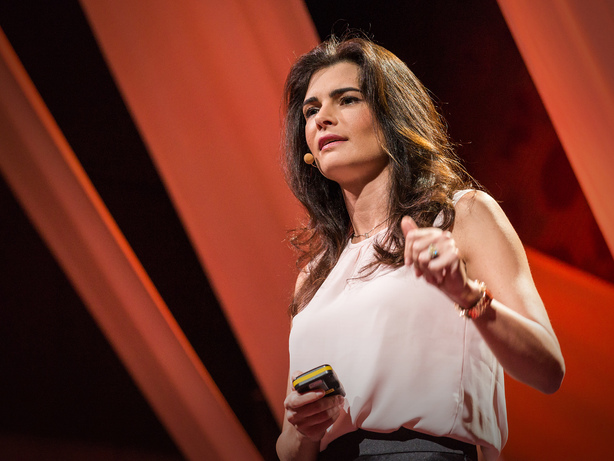"Mom, who are these people?"
“妈妈,这些人是谁?”
It was an innocent question from my young daughter Alia around the time when she was three.
这是来自我小女儿Alia的天真的疑问,大概是在她三岁的时候。
We were walking along with my husband in one of Abu Dhabi's big fancy malls.
我们正与我丈夫走在一块,在阿布扎比的某一间大型豪华购物中心中。
Alia was peering at a huge poster Alia standing tall in the middle of the mall.
仔细端详着立在购物中心中央的巨幅海报。
It featured the three rulers of the United Arab Emirates.
它标示着三位阿拉伯联合酋长国的统治者。
As she tucked in my side,
当她拽着我的衣角,
I bent down and explained that these were the rulers of the UAE
我弯下身然后描述着这就是阿拉伯联合酋长国的统治者,
who had worked hard to develop their nation and preserve its unity.
他们很努力地发展他们的国家,保持他们的团结性。

She asked, "Mom, why is it that here where we live,
她问说:“妈妈,为什么这里,我们住的地方,
and back in Lebanon, where grandma and grandpa live,
和黎巴嫩,爷爷跟奶奶住的地方,
we never see the pictures of powerful women on the walls?
我们从没有看过在墙上有厉害的女人的图片?
Is it because women are not important?"
这是因为女人不重要吗?”
This is probably the hardest question I've had to answer in my years as a parent
这大概是我身为父母以及16年多的职业生涯中
and in my 16-plus years of professional life, for that matter.
曾回答过的最困难的问题了。
I had grown up in my hometown in Lebanon,
我在我的家乡黎巴嫩(Lebanon)长大,
the younger of two daughters to a very hard-working pilot
是两个女儿中的小女儿,父亲是努力工作的飞行员,
and director of operations for the Lebanese Airlines
同时也是黎巴嫩航空的操作总监。
and a super-supportive stay-at-home mom and grandma.
有个超级顾家的母亲与祖母。
My father had encouraged my sister and I to pursue our education
我的父亲很鼓励我们求学,
even though our culture emphasized at the time
即使我们的文化,特别强调在那个时间点,
that it was sons and not daughters who should be professionally motivated.
那是只有儿子而不是女儿应该要被启发的(职业积极性)。
I was one of very few girls of my generation who left home at 18 to study abroad.
我是在我那个年代极少数女孩的其中一个在18岁离开家出国念书。
My father didn't have a son, and so I, in a sense, became his.
我的父亲没有儿子,所以,在某种意义上来说,我变成了儿子。
Fast-forward a couple of decades, and I hope I didn't do too badly in making my father proud of his would-be son.
快转数十年,我希望我没有做得太差,在让我父亲以他试图打造的“儿子”为傲的方面。












